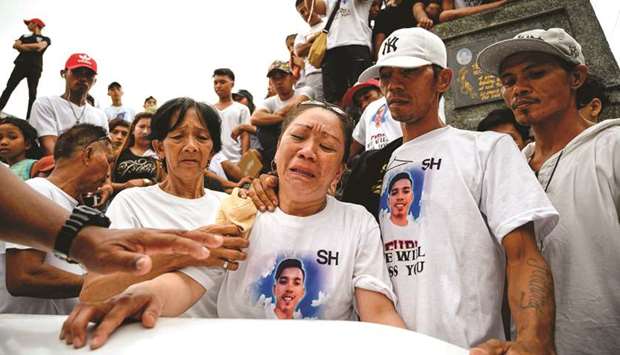President Rodrigo Duterte is set to remain firmly on course in his war on drugs, challenging human rights advocates to prove they have a better approach by solving the Philippine drug menace themselves.
“No, no change,” Duterte said when asked if an impending United Nations Human Rights Commission (UNHRC) investigation into alleged extrajudicial killings committed by his police forces would change anything in his anti-illegal drug campaign.
“It will last until the final day of my term,” he told The Manila Times in an interview.
The Duterte government slammed the UN resolution, calling it political interference in the internal affairs of a sovereign nation.
Before this interview in Malacanang, the president’s spokesman, Malacanang legal counsel Salvador Panelo, told The Times that the UN’s premise was wrong, with its estimate of the anti-drug campaign-related deaths inflated.
In the president’s view, drug trafficking is no ordinary offence, given that it is carried out by organised criminal syndicates. He pointed out that the crime used to carry the death penalty.
While capital punishment continues to be in effect in some countries, it has remained suspended in the Philippines since 2006 after years of petition by several groups, including the Catholic Church.
To further emphasise the gravity of the drug problem in the Philippines, he said the five-month siege of Marawi in 2017 was actually rooted in the drug trade.
Duterte first linked the Marawi siege to narcoterrorism around November 2016. The battle for the southern city in Mindanao claimed about 1,000 lives, including more than 160 soldiers and police officers, and displaced about a million people.
He told The Times that it was actually a drug case that led to fighting after the Marawi police attempted to serve a warrant of arrest to a member of the Maute family. Their resistance to arrest escalated into full-blown rebellion that also drew support from foreigners linked to the Islamic State of Iraq and Syria.
“What was really the beginning? What was the root cause of that, drugs.” Referring to his critics, he said, “They refuse to understand that Marawi then was a big laboratory and all of the supply, almost in all of the Philippines, was coming from there, from that area.”
He later said it was impossible to stop the drug operations in Marawi because of corruption. He added that several mayors in that area ran a “cottage industry,” manufacturing illegal drugs, mainly shabu or methamphetamine hydrochloride.
Duterte, who used to be mayor of Davao City, recounted a statement he heard from Raffy Alunan when he was interior secretary in the 1990s. Alunan had just returned from the US at the time when he convened several mayors in Malacanang.
“The DEA in America told him bluntly that at the rate your country was being swallowed up by drugs, we would not be surprised if you would become a narcostate in due time,” the president said, recounting what Alunan told them then. The DEA is the US drug enforcement agency.
When Duterte ran for president in 2016, there were reports that nine out of 10 villages — or barangay — had been infiltrated by drug syndicates.
Duterte finds it inaccurate to say that his anti-drug war is targeted only at the poor.
He views the illicit drug trade as operating under a sophisticated organisational structure that reaches all the way down to the grassroots level.
When he assumed the presidency in 2016, he found that even some generals were involved in the illicit trade, he said. The Times did not have the opportunity to ask for clarification, but Duterte did say in another part of the interview that he thought highly of military officials. That explains why half of his Cabinet officials are former military personnel.
“The rule in organised crime is (that) the act of one is the act of all,” he told The Times. “Equally guilty.” He also said police officers should be allowed to defend themselves when attacked by those they were arresting for selling drugs.
Later he said fighting the drug syndicate was not going to be won by simply appealing nicely to the traffickers.
Referring to the human rights advocates, Duterte said, “I want them to come here. I will give the powers to run the police. Go ahead, try,” he added, addressing the advocates. “Try to convince these idiots to stop.” While he did admit having some regrets, he appeared certain to stick to his campaign against illicit drugs.
When asked how he rated his anti-drug campaign, he said between “5.6 and 6,” based largely on how much the crime rate has gone down since he assumed office.

Filipina domestic helper, Maria Theresa Conje, cries during the burial of her son Bryan Conje, at Sangandaan Cemetery in Manila yesterday. President Duterte branded as u201cidiotsu201d the governments behind a UN rights body investigation into his narcotics crackdown that has killed thousands and drawn international censure.
